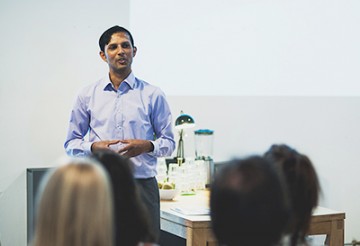When emotion is led by devotion it is called ecstasy. The greatest things in the world have been done by people in ecstacy. This is work of emotion not the mind. Creativity and discovery lie beyond the mind. Emotion is the bridge between conscious and creative thought. Therefore you should learn to use the power of emotion to go beyond the limitations of thought. Among the various functions of the mind, the intellect seems the finest – but without the help of emotional power the intellect is like a lame man who is not capable of reaching his destiny.
The origin of emotions
Though emotion is a great power it needs to be directed wilfully, otherwise it disturbs the mind. In order to know how to best use emotions as a great force we have to discuss the origin of emotions. The prime desire, kama (Sanskrit), creates turmoil in the lake of life. Kama is the mother of all emotions. Desire is the prime factor of all motivations, and actions are performed according to the types of your desires. When you want to fulfil a desire you think, come to a conclusion and then act accordingly. Desires come in varieties – active, passive, negative, positive – in the unconscious and conscious mind, and they come to the surface and disturb the thinking process.
The four primitive fountains or urges
All desires arise from the four primitive fountains: self-preservation, sleep, food and sex. With respect to these fountains humans and animals are alike.
First primitive fountain: self-preservation
The strongest of the four primitive fountains is self-preservation. People are always trying to protect themselves; they are afraid because they do not want to die. The biggest fear is the fear of death. While all great people have achieved a state of fearlessness, most people live under the pressure of fear all the time. All fears are self-created; they come from a desire to obtain something which you are not fully equipped to obtain. Fears develop in the mind and if they are not examined and understood, they grow. You can learn to be fearless. But to develop fearlessness, internal strength is needed, because truth and fearlessness walk hand in hand. To become fearless you must first examine the nature and cause of your fears and go beyond your thinking process. You will discover that the greatest fear is that of fear itself.
Second primitive fountain: sleep
Just as fear can cause discoordination between the mind, body and senses, similar effects can be noticed from irregularities in sleep, the second primitive fountain of emotion. Of all the joys in the world, the most enjoyable is sleep.
Third primitive fountain: food
Food is the third primitive fountain of emotion. Poor food habits can make you emotionally upset and physically ill.
Fourth primitive fountain: sex
Just as food should be regulated, so should sex, the fourth primitive urge. It should not be overdone nor suppressed, since doing either can create many nervous and mental diseases. Sex is the least strong of the four primitive urges; it is the only one we can live without.
Control over the primitive fountains means control over emotions
Those who have regulated the four primitive urges have control over their emotions, and those who have emotional maturity are successful in the world and can be successful in enlightening themselves and attaining the purpose of life, which is self-perfection. You should learn to observe your capacities and be aware of one concept: no extremes. Those who are extremists do not know how to gain control over the urges of food, sleep and sex.
Main streams of negative emotions
When you study the emotions you find that there are seven main streams of negative emotions that arise from the four primitive fountains. The first stream is desire, the second anger, the third pride, the fourth attachment, the fifth greed, the sixth jealousy and the seventh egotism. By examining the seven streams you can analyse yourself. By studying your thoughts, speech and actions you can find out how emotionally mature you are. All control is emotional. Control means regulation and balance within your capacity.
Positive emotions lead to self-growth
You should learn to attain a state of emotional maturity in which you use your emotions positively. Positive emotions lead you to self-reliance and self-confidence, and motivates your mind, speech and action in a joyous and creative way. Positive emotion is very helpful in self-growth.
Analysis of emotions and a self-training method can transform your personality
Analysis of emotions is not sufficient to transform your personality. You need a self-training program to change yourself. If you do not have a self-training program, you may know your problem, but do not know how to get rid of it.
Source: A practical guide to holistic health, Swami Rama








